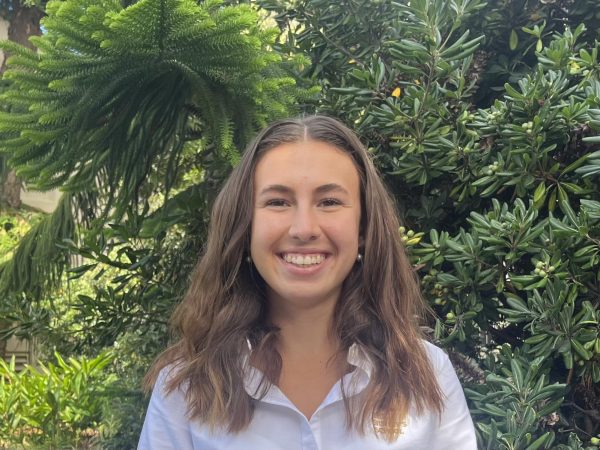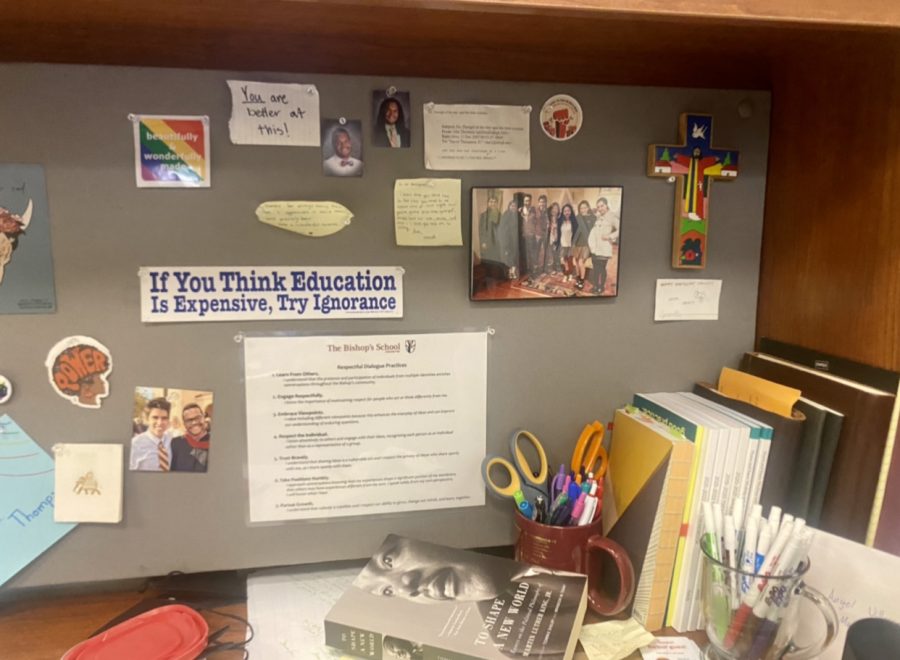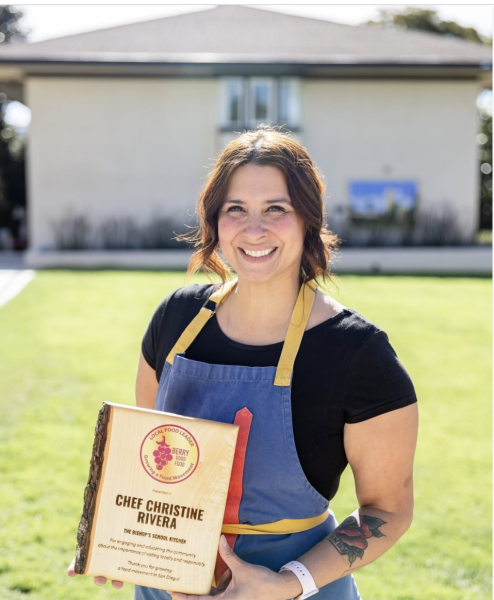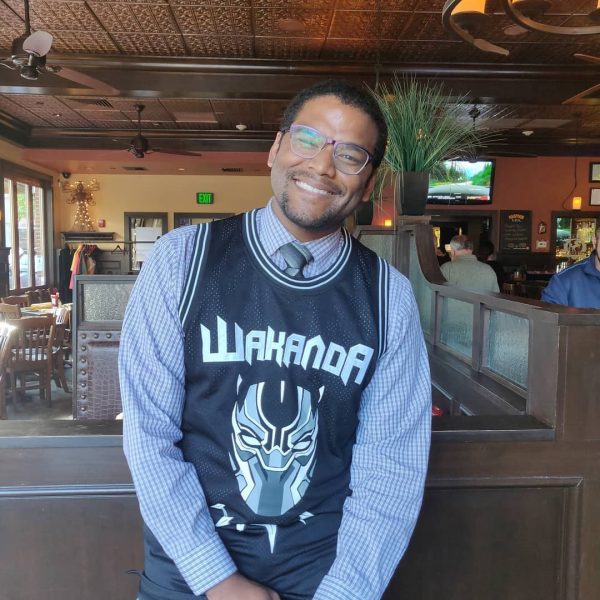The Town Hall: A Recap
The important and major points that were discussed in the town hall on Wednesday January 26
Behind Mr. Thompson’s desk is a series of stickers and photos that promote inclusion and love for one another.
On Tuesday, January 25, the entire Upper School student body and faculty was called into an impromptu meeting in the gym. There, Director of Diversity, Equality, Inclusion and Justice (DEIJ) Mr. David Thompson, explained that two separate ropes reminiscent of nooses had been hung on school property sometime in the preceding days. He explained that nooses sometimes symbolize suicide by hanging, and historically, they have represented the lynching of African Americans. Mr. Thompson also explained that a Swastika had been carved into a teacher’s desk some weeks prior. A town hall was to be held on following day; more than 100 students attended the meeting in the Manchester Board Room.
Mr. Thompson began the town hall by reminding the students of the events that took place. “We do not know what this means,” he explained about the intention behind the nooses. “But we know more than we did yesterday.” He discussed the history of Swastikas and then explained how nooses have been historically used in anti-Black violence and suicide. “We will not tolerate [these kinds of actions] here at Bishop’s,” he said. He then added that the town hall would be split into segments: “One where students are invited to speak directly from the I, and later invited to ask questions and hold dialogue. Town halls are spaces for student voices.”
Zenzele Greene (‘22) read the seven Respectful Dialogue Practices of our community. With those sentiments in mind, Mr. Thompson posed his first question to the group: “What are you thinking about, how are you feeling, and what do you wonder?”
A discussion then began as students started sharing questions and experiences.
Ellie Hodges (‘22) started the conversation off by saying, “I’ve been wondering a lot about what I can do. [When I heard the news], I was really horrified but not surprised… I felt helpless in a lot of ways.” She was followed by Jack Hertz (‘22), who asked, “How can we be more preventative? What can we do now?”
As the town hall continued, the conversation turned to feelings of helplessness and hurt as students wondered how the School could be more proactive.
Angie Robles (‘22) shared her story after finding out about the nooses. She said, “I’ve been here since freshman year and I feel like I’m pretty blessed and lucky…Yesterday was the first instance where I was truly uncomfortable and disgusted about this school.” She continued by saying, “Stepping into a foreign place as a Black student is tough and I’ve done the best to make it my own and make the best opportunity for myself, but seeing a picture like I did yesterday was so horrible.” She paused to collect herself, then continued, “[I couldn’t believe that] the place that has been so welcoming to me since freshman year could be so hurtful to me,” she finished while holding back tears.
Another common question was about the education on racism that the school provides to students. Head Coach of Girls Waterpolo Doug Peabody had earlier asked about when we first start learning about lynching and the history of nooses.
Advay Chandra (‘22) said that incidents like this are “recurring problems…[middle schoolers] commit literal hate crimes every year.” He explained, “It is important to address racial justice issues with middle schoolers [in order to prevent] middle schoolers making these same mistakes.” He paused and then said, “Why is there a lack of education for middle schoolers and underclassmen? This includes [a gap in] areas like DEIJ, classes in racism and social group’s history, and general exposure to issues.”
Will Keefe (‘23) also said, “When considering how we should be educating middle schoolers,” we should be thinking about how to “prevent these things from [happening in] high school.” He continued, saying, “In order to get accountability, you need education first.” Kyle Berlage (‘22) noted, “we don’t learn the complex history behind racism until 11th grade.”
Some other students expressed concerns around education about mental health. Eliana Birbaum-Nahl (‘23) countered misconceptions by explaining, “It’s been scientifically shown that if you teach someone about suicide or depression, it doesn’t make them [feel like] that; if you teach them about that it helps them.”
Another large topic of conversation was the effectiveness of our DEIJ curriculum. Lyla Beamer (‘25) said that the “overarching themes in DEIJ don’t hit home for freshmen.” Marianna Pecora (‘22) said, “We need to see if DEIJ is actionable.” Angie said, “I think the reason a lot of students feel disconnected from DEIJ is because it’s never connected to how the racism in the past effects now,” which got a few nods from the room. Emma Marshall (‘22) said that the first step to preventing these kinds of things happening is to “take the enrichment block seriously [and] do better as a community.”
Another common point of agreement was that we, as a community, need to do a better job at being able to stop these instances from happening. Haha Shi (‘22) said, “We are going on the right path, raising awareness, having this town hall, but that’s not enough—we need to stop being reactionary.” Cristian Casillas (‘22) also said, “We need to stop responding and…start preventing.”
Then the discussion shifted to what students and administrators should do next.
Kosi Eguchi (‘23) said, “Our community is broken by these events. People are hurt, and we need to heal. If you want change, it starts with you—if you want to make that change along with the responsibility and trust [from your peers and faculty], [then] we are also responsible to be that change.” Seiji Ayala-Sekiguchi (‘22) discussed the journey towards becoming a more accountable student body. “Coming out of the pandemic as a community, we haven’t been held accountable for our actions.… It shows this complete disregard for members in our community.” Zen also said, “A lot of what we are saying comes back to the idea of follow through—[this work] means nothing if we don’t [do better] in practice.”
Catalina McFarland (‘23) provided the town hall’s closing thought: “The simplest thing that we all can do from here on out is not to forget what we said here [today],” she said. “We have the power to make change; we can have that kind of change outside of this room. We have to keep up with this feeling. The unity that we feel here can’t be gone. When you walk out the door, take with you everything that was said and everything we intend to do.”

This is Leila’s fourth year on the staff and her second as Editor-In-Chief. Leila loves The Tower as much as she loves field hockey, peach Snapple, the...






